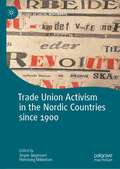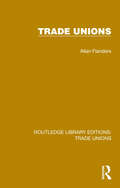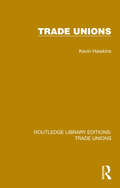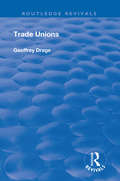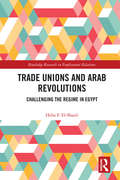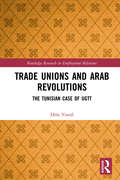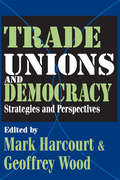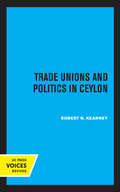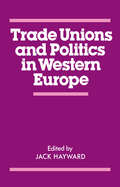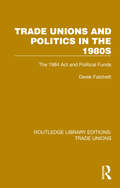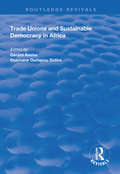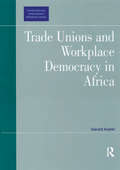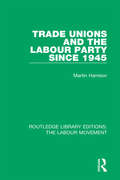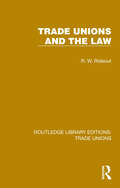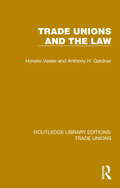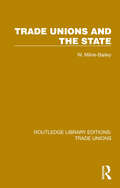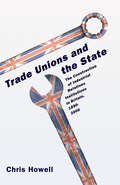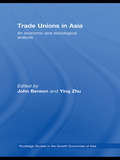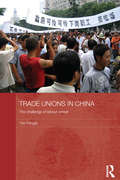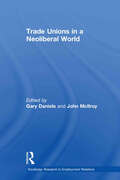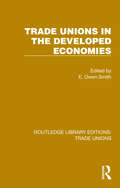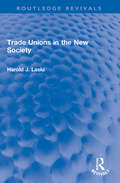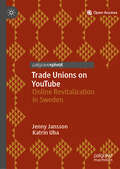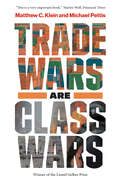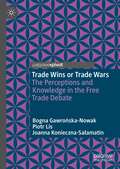- Table View
- List View
Trade Union Activism in the Nordic Countries since 1900 (Palgrave Studies in the History of Social Movements)
by Flemming Mikkelsen Jesper JørgensenProviding a Nordic historical perspective, this collection aims to further our understanding of trade union activism and its role in modern society. Contributions from a range of leading scholars analyse the organisational conditions of mobilisation that were deployed by Nordic unionists, and explore the way that they interacted with other forms of social and political protest during the twentieth century. Covering illegal or so-called wildcat strikes, blockades, demonstrations and other activist measures, the authors examine the way that trade union activism in the Nordic countries aimed to move the political combat zone from the meeting rooms of the respective confederations into the streets and the public domain. The collection focuses on cases from Denmark, Sweden, Norway and Finland, but comparisons are also made with countries such as Iceland, Germany, and the USA. Exploring the ways in which political parties have intervened in Nordic trade union activism since the early twentieth century, this unique collection offers new insights for those interested in labour market dynamics and the complex process behind the formation of salary and employment conditions.
Trade Unions (Routledge Library Editions: Trade Unions #7)
by Allan FlandersOriginally published in 1952, Trade Unions quickly became a classic and went through 7 editions. It is a brief yet comprehensive guide to the complex structure and administration of British Trade Unions, which deals concisely and lucidly with every important aspect of the complicated tangle of organisations.
Trade Unions (Routledge Library Editions: Trade Unions #9)
by Kevin HawkinsOriginally published in 1981, Trade Unions was written at a time when there was a widespread belief that Britain’s trade unions were undemocratic, obstructive and strike-prone. This book argues that throughout their history, British trade unions have played a reactive role, and that their objectives, organization and tactics have been shaped by the actions of others, whether employers, governments or the judiciary. The book examines the historical development of the trade union movement and its long running battle with lawyers and judges. It then analyses trade union structure, organization and government and looks at the pattern of union activity in the workplace. Trade Unions will be of interest to students of industrial relations, politics and management studies and for anyone interested in the role of unions within contemporary British society.
Trade Unions (Routledge Revivals)
by Geoffrey DrageFirst published in 1905, this book offers a perspective on the aims and objectives of British trade unions. It details the history, constitution and aims of the trade union, challenging the misconception that a trade union exists solely to foster strikes, harass employers and hamper industry, and discussing the many positives of such organisations. Designed to be accessible for the general public, this book covers history, organisation, function, action and influence.
Trade Unions and Arab Revolutions: Challenging the Regime in Egypt (Routledge Research in Employment Relations)
by Heba F. El-Shazli“We started the 2011 revolution and the rest of Egypt followed,” say Egyptian workers with strong conviction and passion. Egyptian independent workers’ continuous claims of contention and protest repertoires were one of several main factors leading to the January 25, 2011, uprising. After thirty-two years of a Mubarak-led authoritarian regime, massive protests began in January 2011 and forced President Mubarak to step down from his position on February 11, 2011. So, how did Egyptian workers challenge the regime and how did they become one of the factors leading to the January 2011 uprising? These workers were organized into loose networks of different independent groups that had been protesting for a decade and longer prior to January 2011. These regular protests for over a decade before 2011 challenged the Egyptian authoritarian regime. This book examines the combative role of Egyptian independent workers’ formal and informal organizations as a contentious social movement to challenge the regime. It will examine the evolving role of workers as socio-economic actors and then as political actors in very political transitions. Social movement theory (SMT) and its mechanisms and social movement unionism (SMU) will be the lenses through which this research will be presented. The methodology used will be the comparative case studies of two different movements where workers who advocated for their rights for a decade prior to January 2011 experienced significantly differing outcomes. One case study showcases the municipal real estate tax collection workers who were able to establish a successful social movement and then create an independent trade union. The second case study examines an influential group of garment and textile workers, who also developed an effective social movement, yet they were not able to take it to the next step to establish an independent union. I will explore within this research a second question: why one group of workers was able to establish an independent union while the other arguably more influential group of workers, the garment and textile workers, was not able to do so. This had an impact on the overall influence they were able to exercise over the regime in addition to their effectiveness as a social movement for change.
Trade Unions and Arab Revolutions: The Tunisian Case of UGTT (Routledge Research in Employment Relations)
by Hèla YousfiThis book traces the role of the UGTT (the Tunisian General Labour Union) during Tunisia’s 2011 revolution and the transition period that ensued – Tunisia being the Arab country where trade unionism was the strongest and most influential in shaping the outcomes of the uprising. The UGTT; From its role as the cornerstone of the nationalist movement in the colonial era, has always had a key place in Tunisian politics: not so much a labour union but as an organisation that has always linked social struggles to political and national demands. Examining the role played by the UGTT in Tunisia's revolution and more generally in the restructuring of the Tunisian political arena during the three years following the popular uprising. This book asks searching questions such as; how did UGTT interact with the popular uprising that led to the departure of Ben Ali? What was the role played by the UGTT in the "political transition" leading to the adoption on January 26, 2014 of the first democratic constitution in the country’s history? How successful was the UGTT in neutralizing the risk of self- implosion caused by the different political and social crises? And what are the challenges that the UGTT faces in the new political landscape? This volume will be of key reading interest to scholars and researchers of social movements, labour movements, organizational studies, political transitions and Arab revolutions and also likely to be of interest to practitioners especially among activists, unionists and advocates within civil society.
Trade Unions and Democracy: Strategies and Perspectives (G - Reference, Information And Interdisciplinary Subjects Ser.)
by Geoffrey WoodTrade Unions and Democracy explores the role of trade unions as products of, and agents for, democracy. As civil society agents, unions may promote democracy within the wider society, especially in the case of authoritarian regimes or other rigid political systems, by acting as watchdogs and protecting hard-won democratic gains.Established democratic institutions in many advanced societies are facing new challenges. The problem with using trade unions for this purpose is that they remain locked in a cycle of political marginalization and decline. Beyond this, there are, ironically, serious questions about whether unions themselves internally function as democracies. Certainly there are tensions between rank and file membership and an authoritarian leadership, with this infighting having possible effects on strategic deals or alliances and member accountability and actions. On the other hand, trade unions continue to represent a significant component of society within most industrialized countries, and in many case, they have a demonstrated capacity for working with other elements of civil society. Looking forward, trade unions may be able to play a vital role in channeling and focusing spontaneous popular upsurges. In the process, they may revitalize themselves through use of greater internal democracy and become geared toward more diverse constituencies. The question is, will they fulfill this promise or continue to suffer from internal breakups and external breakdowns? Can trade unions save themselves and democracy, or will both deteriorate in time?Trade Unions and Democracy brings together a distinguished panel of leading and emerging scholars in the field and provides a critical assessment of the current role of trade unions in society. It explores their capacity to affect political policies to ensure greater accountability and fairness. It also explores the nature of and extent to which internal representative democracy actually operates within trade unions themselves.Mark Harcourt is a professor in the Department of Strategic Management and Leadership at Waikato University in New Zealand.
Trade Unions and Politics in Ceylon (Center for South and Southeast Asia Studies)
by Robert N. KearneyThis title is part of UC Press's Voices Revived program, which commemorates University of California Press’s mission to seek out and cultivate the brightest minds and give them voice, reach, and impact. Drawing on a backlist dating to 1893, Voices Revived makes high-quality, peer-reviewed scholarship accessible once again using print-on-demand technology. This title was originally published in 1971.
Trade Unions and Politics in Western Europe
by J. E. HaywardThis book analyses the politics and political issues associated with Trade Unions and Trade Unionism in Western Europe.
Trade Unions and Politics in the 1980s: The 1984 Act and Political Funds (Routledge Library Editions: Trade Unions #6)
by Derek FatchettOriginally published in 1987, this book traces the historical and sociological dimensions of the Trade Union movement and analyses the nature of the trade unions’ involvement in the UK Labour Party during the 1970s and 80s. It discusses the review campaigns, and their implications, both for trade unions specifically and for politics in general. From the viewpoint of the trade unions, this book tells of an experience which was, for the Thatcher era, uniquely successful and innervating, opening up new approaches to campaigning.
Trade Unions and Sustainable Democracy in Africa (Routledge Revivals)
by Gerard Kester Ousmane Oumarou SidibeFirst published in 1997, this volume sets out to open a dialogue with the trade union movement and its social partners including civil society, political leaders and the scientific community. The authors, all of whom work closely with APADEP, have drawn on their personal experience and have been guided by a simple, yet flexible, theme: trends in the last few decades in their countries, with the emphasis on transition over the last five years. Part I consists of an overview of sub-Saharan Africa based on selected documentation. Part II is given over to an analysis of the specific situations obtaining in ten African countries in different geographical and language areas. Each case study provides its own democratisation scenario.
Trade Unions and Workplace Democracy in Africa (Contemporary Employment Relations)
by Gérard KesterCan democracy only survive if it is participatory? Is participatory democracy a prerequisite for sustainable development? Are trade unions the most appropriate body through which such aims can be implemented? These critical questions are tackled in Gérard Kester's book, Trade Unions and Workplace Democracy in Africa, which applies an unparalleled depth of research to these issues as they impact African nations, including: Cape Verde, Burkina Faso, Mali, Guinea, Ghana, South Africa, Zambia, Tanzania and Zimbabwe. Rigorously structured, it sets the background of the research and the underlying theory, before presenting the learning experiences within different countries and the the broad implications of the research findings for policy making on democratic participation.
Trade Unions and the Labour Party since 1945 (Routledge Library Editions: The Labour Movement #15)
by Martin HarrisonFirst published in 1960. This title is a study of one of the most controversial alliances in British political history. The ‘wage freeze’, Bevanism, the block vote, nuclear disarmament: these are only a few of the points at which the unions’ activities within the Labour Party had roused hot debate. Drawing extensively on previously unpublished material and on discussions with past members of the Labour Movement, the author creates a survey of what the partnership really amounted to.
Trade Unions and the Law (Routledge Library Editions: Trade Unions #19)
by R. W. RideoutOriginally published in 1973, this book was designed as a concise and usable guide to those aspects of the law which particularly affect trade union members and officials. It deals with the internal and external affairs of trade unions and the law relating to collective bargaining. It also covers deals with dismissal from employment, redundancy and employers’ liability for industrial injuries. The information is presented in a readable form without technical footnotes but with a considerable amount of background information. Diagrams and charts are used where applicable to present or reinforce information.
Trade Unions and the Law (Routledge Library Editions: Trade Unions #21)
by Horatio Vester Anthony H. GardnerOriginally published in 1955, this book describes in a clear and concise way the nature of a Trade Union in England from the legal point of view, the particular aspects of the Law which make it possible for Trade Unions to carry on their activities and the restraints which the Law place on them for the protection of their members and the community. It briefly reviews the history of Trade Union Law, describes the Acts of Parliament which made the modern Trade Union possible and deals with those aspects of the Law which are important for those who have industrial relations with Trade Unions.
Trade Unions and the State (Routledge Library Editions: Trade Unions #4)
by W. Milne-BaileyOriginally published in 1934, Trade Unions and the State is a study of political institutions. This is a lucid account of the diverse views that have been held about the nature, attributes, functions and prerogatives of the State. The book analyses the changing status and treatment of Trade Unions under the law of the UK during the early part of the 20th century.
Trade Unions and the State: The Construction of Industrial Relations Institutions in Britain, 1890-2000
by Chris HowellThe collapse of Britain's powerful labor movement in the last quarter century has been one of the most significant and astonishing stories in recent political history. How were the governments of Margaret Thatcher and her successors able to tame the unions? In analyzing how an entirely new industrial relations system was constructed after 1979, Howell offers a revisionist history of British trade unionism in the twentieth century. Most scholars regard Britain's industrial relations institutions as the product of a largely laissez faire system of labor relations, punctuated by occasional government interference. Howell, on the other hand, argues that the British state was the prime architect of three distinct systems of industrial relations established in the course of the twentieth century. The book contends that governments used a combination of administrative and judicial action, legislation, and a narrative of crisis to construct new forms of labor relations. Understanding the demise of the unions requires a reinterpretation of how these earlier systems were constructed, and the role of the British government in that process. Meticulously researched, Trade Unions and the State not only sheds new light on one of Thatcher's most significant achievements but also tells us a great deal about the role of the state in industrial relations.
Trade Unions in Asia: An Economic and Sociological Analysis (Routledge Studies In The Growth Economies Of Asia Ser.)
by John Benson Ying ZhuOffering a comprehensive account of the role of trade unions in Asia today, this book, put together by two editors who have published extensively in the areas of business and economics in Asia, covers all the important Asian economies: both developed and developing.Making a vital contribution to the very small amount of literature that has been pub
Trade Unions in China: The Challenge of Labour Unrest (Routledge Contemporary China Series)
by Tim PringleThe transition from a command economy to a capitalist market economy has entirely altered the industrial landscape in which Chinese trade unions have to operate. This book focuses on how the All China Federation of Trade Unions (ACFTU) is reforming under current conditions and demonstrates that labour unrest is the principal driving force behind trade union reform in China. Presenting case studies where reform has been largely inspired by the pressure of worker activism from below, the book examines three crucial areas of trade union activity - collective bargaining, labour rights and trade union direct elections - against the background of China’s turbulent industrial relations history. As well as exploring the principal direction of trade union reform, which has been to channel disputes into juridical forms of dispute resolution sponsored by the State, the book also highlights key examples of more innovative experiments in trade union work. These represent a clear break with past practice and, crucially, have been recognised by both the union and Party leaderships as models for future trade union policy and practice. The book provides both a timely reference point and highlights the road to effective trade union solidarity.
Trade Unions in a Neoliberal World: British Trade Unions under New Labour (Routledge Research in Employment Relations)
by Gary Daniels John McIlroyTrade Unions in a Neoliberal World is the first book to provide readers with an authoritative and comprehensive assessment of the impact of New Labour governments on employment relations and trade unions. This innovative text locates changes in industrial politics since the 1990s in the development of globalization and the worldwide emergence of neoliberalism. The advent of Tony Blair’s government in 1997 promised a new dawn for employment relations. In this rigorous but readable volume, a team of experienced and respected contributors explain in detail how the story has unfolded. This book looks at all aspects of New Labour’s policies in relation to employment relations and trade unionism. The first half of Trade Unions in a Neoliberal World presents an overview of industrial politics, the evolution of New Labour and an anatomy of contemporary trade unionism. It discusses relations between the Labour Party and the unions and the response of trade unionists to political and economic change. The second part contains chapters on legislation, partnership, organizing, training, strikes and perspectives on Europe.
Trade Unions in the Developed Economies (Routledge Library Editions: Trade Unions #16)
by E. Owen SmithOriginally published in 1981, Trade Unions in the Developed Economies is a collection of studies on the growth, structure and policies of trade unions in 7 developed economies. The early growth of trade unions has been summarised so that a post-Second World War analysis could be undertaken. The section on growth contains an examination of the extent to which conflict between the parties has either increased or decreased. All developments are viewed against a backcloth of general economic developments and the statistical data deal with trends rather than particular developments at any one point. The section on structure analyses how changes in the structure of the labour force have been reflected by changes in the structure of trade unions. Inter-union relations are examined in this and other contexts. The policy section examines the main bargaining issues and the methods employed to achieve these goals.
Trade Unions in the New Society (Routledge Revivals)
by Harold J. LaskiFirst Published in 1950, Trade Unions in the New Society examines the changing significance of trade unionism and the place they occupy in the democratic world. Harold J. Laski contrasts their function in a capitalist or socialist society with what it became under Russian totalitarianism. This book explores the relation between trade unions and the public, trade unions and the law and trade unions and democracy to show the impact of developments such as mass production, social security and a planned economy on the position of the working man and considers the proper role of the government in disputes which may affect the basic public welfare. Most important of all, possibly, are Laski’s observations on the desirability of labour activity in organised politics. Trade Unions in the New Society will be of immense interest for scholars and researchers of politics, political economy, labour studies, and for all who are concerned with the future of democracy.
Trade Unions on YouTube: Online Revitalization in Sweden
by Katrin Uba Jenny JanssonThis open access book investigates how trade unions representing different social classes use YouTube videos for renewal purposes. Information and communication technology has undoubtedly offered new opportunities for social movements, but while research suggests that these new means of communication can be used for trade union revitalization, few studies have examined what unions actually do on social media. By analysing more than 4500 videos that have been uploaded by Swedish trade unions, Jansson and Uba explore how unions use YouTube to address issues such as recruiting new members, improving internal democracy, promoting political campaigns and constructing (new) self-images. The results demonstrate that trade unions representing a range of social classes use different revitalization strategies via YouTube. This research will be of use to students and scholars researching European politics and political participation, trade unionism and labour movements in the digital age.
Trade Wars Are Class Wars: How Rising Inequality Distorts the Global Economy and Threatens International Peace
by Michael Pettis Matthew C. KleinA provocative look at how today&’s trade conflicts are caused by governments promoting the interests of elites at the expense of workers Trade disputes are usually understood as conflicts between countries with competing national interests, but as Matthew C. Klein and Michael Pettis show, they are often the unexpected result of domestic political choices to serve the interests of the rich at the expense of workers and ordinary retirees. Klein and Pettis trace the origins of today&’s trade wars to decisions made by politicians and business leaders in China, Europe, and the United States over the past thirty years. Across the world, the rich have prospered while workers can no longer afford to buy what they produce, have lost their jobs, or have been forced into higher levels of debt. In this thought‑provoking challenge to mainstream views, the authors provide a cohesive narrative that shows how the class wars of rising inequality are a threat to the global economy and international peace—and what we can do about it.
Trade Wins or Trade Wars: The Perceptions and Knowledge in the Free Trade Debate
by Piotr Lis Bogna Gawrońska-Nowak Joanna Konieczna-SałamatinThis book tackles the disconnect between social perceptions and expert knowledge regarding trade policy decisions. Using a Polish language internet database, the authors shed light on areas that need to be addressed when considering the adoption of particular trade policies by applying content and statistical analysis to produce an easy to deploy measure of populism in digital media, the “Media Populism Ratio”. Defining a mismatch between social perception and expert knowledge may contribute to a better understanding of the controversies on free trade, as well as properly defining possible sources of populism and social conflicts – therefore also revealing some potential weaknesses in the trade policy implementation level which are at times neglected or underestimated. The book will be relevant to students and researchers interested in economic policy, economic narratives and cultural economics.
